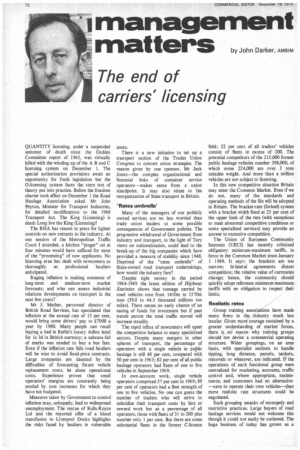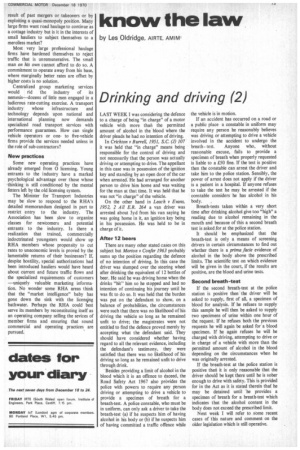'management
Page 74

Page 75

If you've noticed an error in this article please click here to report it so we can fix it.
matters by John Darker AMBI M
The end of carriers' licensing
QUANTITY licensing, under a suspended sentence of death since the Geddes Committee report of 1965, was virtually killed with the winding up of the A B and C licensing system on December 1. The special authorization provisions await an opportunity for fresh legislation but the 0-licensing system faces the stern test of theory put into practice. Before the freedom charter took effect on December 1 the Road Haulage Association asked Mr John Peyton, Minister for Transport Industries, for detailed modifications to the 1968 Transport Act. The King (Licensing) is dead: Long live the King (Licensing)!
The RHA has reason to press for tighter controls on new entrants to the industry. At one session of the Metropolitan Traffic Court I attended, a kitchen "pinger" set at four minutes would have sufficed for most of the "processing" of new applicants. No licensing area has dealt with newcomers as thoroughly as professional hauliers anticipated.
Raging inflation is making nonsense of long-term and medium-term market forecasts; and who can assess industrial relations developments on transport in the next few years?
Mr J. Mather, personnel director of British Road Services, has speculated that inflation at the annual rate of 15 per cent, would bring some drivers' pay to £7000 a year by 1980. Many people can recall buying a bed in Berlin's luxury AdIon hotel for Is 3d in British currency; a suitcase full of marks was needed to buy a bus fare. Even if the inflation rate falls road hauliers will be wise to avoid fixed-price contracts. Large companies are daunted by the difficulties of forecasting future vehicle replacement costs, let alone operational costs. Experience proves that small operators' margins are constantly being eroded by cost increases for which they have not budgeted.
Measures taken by Government to control inflation may, unhappily, lead to widespread unemployment. The rescue of Rolls-Royce Ltd and the reported offer of a blood transfusion to Liverpool Docks highlights the risks faced by hauliers in vulnerable areas.
There is a new initiative to set up a transport section of the Trades Union Congress to concert union strategies. The reason given by one sponsor, Mr Jack Jones—the complex organizational and financial links of container service operators—makes sense from a union standpoint. It may also relate to 'the reorganization of State transport in Britain.
'Rates umbrella'
Many of the managers of our publicly owned services are no less worried than trade union leaders at some possible consequences of Government policies. The progressive withdrawal of Government from industry and transport, in the light of Tory views on nationalization, could lead to the break-up of the big companies which have provided a measure of stability since 1948. Deprived of the "rates umbrella" of State-owned road transport undertakings, how would the industry fare?
Despite tight money in the period 1964-1969 the latest edition of Highway Statistics shows that tonnage carried by road vehicles rose from 1410m to 1570m tons (39.0 to 44.5 thousand millions ton miles). There seems no early chance of an easing of funds for investment but if past trends persist the total traffic moved will increase steadily.
The rapid influx of newcomers will upset the competitive balance in many specialized sectors. Despite many mergers in other spheres of transport, the percentage of operators with a single vehicle in public haulage is still 48 per cent, compared with 50 per cent in 1963; 82 per cent of all public haulage operators had fleets of one to five vehicles in September 1969,
In own-account work, single vehicle operators comprised 57 per cent in 1969; 89 per cent of operators had a fleet strength of one to five vehicles. No one can guess the number of traders who will strive to subsidize their transport costs by hire or reward work but as a percentage of all operators, those with fleets of 31 to 200 plus number only 1 per cent. But there are some substantial fleets in the former C-licence
field; 22 per cent of all traders' vehicles consist of fleets in excess of 200. The potential competitors of the 215,000 former public haulage vehicles number 398,000, of which some 224,000 are over 3 tons unladen weight. And more than a million vehicles are not subject to licensing.
In this new competitive situation Britain may enter the Common Market. Even if we do not, many of the standards and operating methods of the Six will be adopted in Britain. The bracket-rate (forked) system with a bracket width fixed at 23 per cent of the upper limit of the rate (with exceptions to meet abnormal competitive conditions or some specialized services) may provide an answer to excessive competition.
The Union of European Community Interests (UECI) has recently criticized obligatory minimum-maximum tariffs, in force in the Common Market since January I 1969. It says: the brackets are too narrow; bi-later al agreements distort competition; the relative value of currencies change; hence, the community should quickly ad opt reference minimum-maximum tariffs with no obligation to respect their limits.
Realistic rates _Group training associations have made many firms in the industry much less insular. Given more courage sustained by a greater understanding of market forces, there is _AO reason why training groups should not devise a commercial operating structure. Wider groupings, on an area basis, with specialist sections to handle tipping, long distance, parcels, tankers, removals or whatever, are indicated. If the operations of each functional group were centralized for marketing, accounts, traffic control and, where appropriate, maintenance, and customers had no alternative-save to operate their own vehicles—then more realistic rate structures could be negotiated.
Such grouping smacks of monopoly and restrictive practices. Large buyers of road haulage services would not welcome this though it could not easily be outlawed. The huge business of today has grown as a result of' past mergers or takeovers or by exploiting a quasi-monopoly position. Many large firms want road haulage to continue as a cottage industry but is it in the interests of small hauliers to subject themselves to a merciless market?
Most very large professional haulage firms have hardened themselves to reject traffic that is unremunerative. The small man on his own cannot afford to do so. A commitment to operate away from his base, where marginally better rates are offset by higher costs is no solution.
Centralized group marketing services would rid the industry of its nemesis—dozens of little men engaged in a ludicrous rate-cutting exercise. A transport industry whose infrastructure and technology depends upon national and international planning now demands specialized road transport services with performance guarantees. How can single vehicle operators or oneto five-vehicle firms provide the services needed unless in the role of sub-contractors?
New practices
Some new operating practices have already emerged from 0 licensing. Young entrants to the industry have a marked psychological advantage over those whose -thinking is still conditioned by the mental fetters left by the old licensing system.
The Minister for Transport Industries may be slow to respond to the RHA's detailed memorandum designed in part to restrict entry to the industry. The Association has been slow to organize classes for newcomers and potential entrants to the industry. Is there a realization that trained, commercially indoctrinated youngsters would show up RHA members whose propensity to cut rates to uneconomic levels is proved by the lamentable returns of their businesses? If, despite hostility, special authorizations had been introduced hauliers would have heard about current and future traffic flows and the specialized requirements of customers —uniquely valuable marketing information. No wonder some RHA areas think that the "market intelligence" baby has gone down the sink with the licensing bathwater. Perhaps the RHA could best serve its members by reconstituting itself as an operating company selling the sevices of member firms and ensuring that sound commercial and operating practices, are pursued.






















































































































